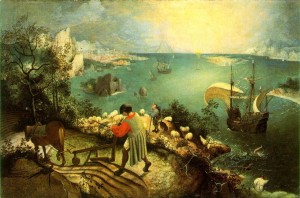
During the month of March, we’ll be exploring the theme “The Page Transformed: Intersections of Poetry & The Visual Arts” in our posts. We’re interested in ways in which poetry and the visual arts speak to one another, inform each other’s practices, and blend with one another on the page. We’ll begin with an examination of ekphrastic poetry, and will eventually move on to explore other areas of intersection – the book as a physical object of beauty, for example, and broadsides and typography (poetry as visual art). We also hope to feature conversations poets who engage in both the visual arts and poetry, as well as a couple of posts about visionary experimental figures like Theresa Hak-Kyung Cha, who pushed the boundaries of text as object. Our prompts this month will also work in with our theme, and (we hope) will provide exercises that ask you to creatively engage with and perhaps try out some of the topics we’ll cover in our Editors’ Picks and Interview posts.
For this week and the beginning of next, we’ll be focusing on ekphrasis and ekphrastic poetry. The Academy of American Poets’ website gives what I think is a helpful definition of ekphrasis: “poetry confronting art.” The idea of the image which confronts and subsequently moves the poet to speak is clearly reflected in what is perhaps one of the best loved examples of American ekphrastic poetry: William Carlos William’s “Landscape with the Fall of Icarus,” based on Breughel’s painting “The Fall of Icarus.” In his poem, Williams interprets the actions of the figures in the painting, highlighting the isolation of Icarus’s action in the larger context of the scene — while country people go about their daily lives, herding sheep and plowing fields, Icarus is visible only as a tiny pair of legs attached to an unseen body already engulfed in water. Only one man looks up to the sky, but has already missed the action. Williams plays powerfully on the desolate futility that he reads into Breughel’s interpretation of the myth:
unsignificantly
off the coast
there wasa splash quite unnoticed
this was
Icarus drowning
Williams’ poem is certainly a famous one. But perhaps my favorite meditation on the commonalities between the work of the poet and painter in creating imagery that will resonate in the mind of the viewer or reader is Robert Lowell’s Vermeer-inspired poem “Epilogue,” which I will leave you with:
Epilogue
by Robert LowellThose blessèd structures, plot and rhyme—
why are they no help to me now
I want to make
something imagined, not recalled?
I hear the noise of my own voice:
The painter’s vision is not a lens,
it trembles to caress the light.
But sometimes everything I write
with the threadbare art of my eye
seems a snapshot,
lurid, rapid, garish, grouped,
heightened from life,
yet paralyzed by fact.
All’s misalliance.
Yet why not say what happened?
Pray for the grace of accuracy
Vermeer gave to the sun’s illumination
stealing like the tide across a map
to his girl solid with yearning.
We are poor passing facts,
warned by that to give
each figure in the photograph
his living name.
[Text of “Epilogue” courtesy of poetryoutloud.org. To read more about ekphrasis, visit this article on the Academy of American Poets’ website.]